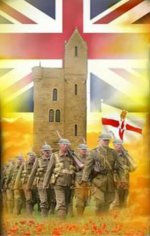Ooh It’s a Corner
Well-known member
'Song Of The Somme’
Today, on the 105th anniversary of the first day of the Battle of the Somme, Lest We Forget.
July 1st 1916 marked the heaviest day’s loss that a British army has ever suffered. 19,240 British soldiers, including those from the United Kingdom, Australia, India, South Africa, New Zealand, Newfoundland and Canada, tragically lost their lives on the battlefield and another 38,230 soldiers were wounded. During the 141 days of this horrific battle, operations continued on the Western Front of Northern France, and men from every part of Britain and across the British Empire took part. The forces of the British Empire suffered 420,000 casualties, many never returning to their families and loved ones; and those who did, were never the same men who left our shores. One man was killed every 4.4 seconds, making July 1, 1916, the bloodiest single day in the history of the British Army. Never let their sacrifices be forgotten.
Today, on the 105th anniversary of the first day of the Battle of the Somme, Lest We Forget.
July 1st 1916 marked the heaviest day’s loss that a British army has ever suffered. 19,240 British soldiers, including those from the United Kingdom, Australia, India, South Africa, New Zealand, Newfoundland and Canada, tragically lost their lives on the battlefield and another 38,230 soldiers were wounded. During the 141 days of this horrific battle, operations continued on the Western Front of Northern France, and men from every part of Britain and across the British Empire took part. The forces of the British Empire suffered 420,000 casualties, many never returning to their families and loved ones; and those who did, were never the same men who left our shores. One man was killed every 4.4 seconds, making July 1, 1916, the bloodiest single day in the history of the British Army. Never let their sacrifices be forgotten.



